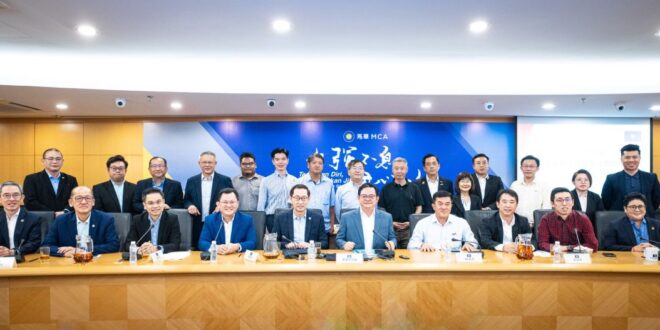KUALA LUMPUR: The MCA Economic and SME Committee’s recent dialogue underscored the critical need for careful fiscal reforms, support for small and medium-sized enterprises (SMEs) innovation, and enhanced competitiveness to ensure economic stability in Malaysia.
The dialogue, titled “SME Dialogue: Malaysia’s Current Economic Situation and the 2025 Budget,” held on July 31 and chaired by MCA vice-president and committee chairman, Datuk Lawrence Low provided a platform for addressing these urgent issues.
The meeting, attended by representatives from 12 local business associations, addressed critical issues such as taxation, diesel and RON95 subsidies, minimum wage policies, and e-invoicing, offering valuable insights for government policy formulation.
Low highlighted the severe impact of new and increased taxes on SMEs, including the hike in service tax (SST) from 6% to 8%, a new 10% capital gains tax, the low-value goods tax (LVGT), expanded tobacco taxes, and higher sugary drink taxes, alongside the potential introduction of a high-value goods tax (HVGT).
He emphasised that Malaysia is at a crucial juncture where national leaders must reconsider how to support the growth of domestic SMEs.
Calls for diversified revenue and SME support
Meanwhile, Associated Chinese Chamber of Commerce and Industry of Malaysia (ACCCIM) treasurer Datuk Koong Ling Long stressed that the government should not rely solely on taxes for revenue.
He urged for increased focus on domestic investments and highlighted the pressures local SMEs face from cheaper Chinese goods and the Regional Comprehensive Economic Partnership (RCEP).
Koong recommended more financial and technical support for SMEs, including a special task force within the Ministry of Investment, Trade, and Industry to enhance competitiveness.
ACCCIM’s central council member and environmental, social, and governance (ESG) director Datuk Teh Kok Lim called for governmental assistance in helping SMEs transform their business models to navigate the evolving global economic landscape.
Potential reintroduction of GST
Low noted that the SST created a “tax-on-tax” effect, leading to higher consumer prices and reduced purchasing power.
SME Association of Malaysia national vice president Datuk Seri Ricky Yaw advocated for the reintroduction of Goods and Services Tax (GST), suggesting it as a superior tax system and recommending it start at a rate of 4%.
Datuk Chua Tia Guan, a senior member of the Special Task Force to Facilitate Business (PEMUDAH) highlighted the need for balanced tax policies to avoid inflationary impacts, urging careful evaluation of GST’s potential effects on the populace.
Combating illegal imports and supporting tourism
Federation of Sundry Goods Merchants Association of Malaysia (FSGMAM) president Hong Chee Meng urged the government to tackle illegal imports and smuggling to protect local retailers. He suggested strengthening customs and market supervision to combat illegal trade, ensuring market order, and protecting the interests of legitimate businesses.
Malaysian Chinese Tourism Association (MCTA) president Patrick Law underscored the tourism industry’s challenges, including the absence of diesel subsidies, multiple SST layers, and driver shortages. He called for targeted incentives to support the industry during Visit Malaysia Year.
Malaysian Bus Operators Association president Jackie Chew echoed these concerns, highlighting the severe impact of rising diesel prices and driver shortages on the industry.
Cautious approach to subsidy reforms
Low warned against abruptly removing RON95 petrol subsidies, as it would lead to increased costs for consumers and another wave of inflation. He recommended a phased approach to subsidy reforms to prevent market disruptions.
Chew Kin Fai, General Secretary of the Kuala Lumpur and Selangor Ku Su Shin Choong Hing Restaurant Association called for delaying new tax policies due to the sluggish economy.
All groups concurred that the government must carefully plan fiscal reforms to reduce living costs, support SME innovation, enhance competitiveness, and ensure economic stability.
The meeting’s outcomes will be compiled into a proposal and submitted to the Ministry of Finance for consideration in the Budget 2025.
This proposal will also be presented to MCA president Datuk Seri Ir. Dr. Wee Ka Siong and vice president Datuk Seri Dr. Wee Jeck Seng for direct discussion with the Prime Minister.
 BeritaKini.biz Berita Viral Terkini di Malaysia
BeritaKini.biz Berita Viral Terkini di Malaysia





